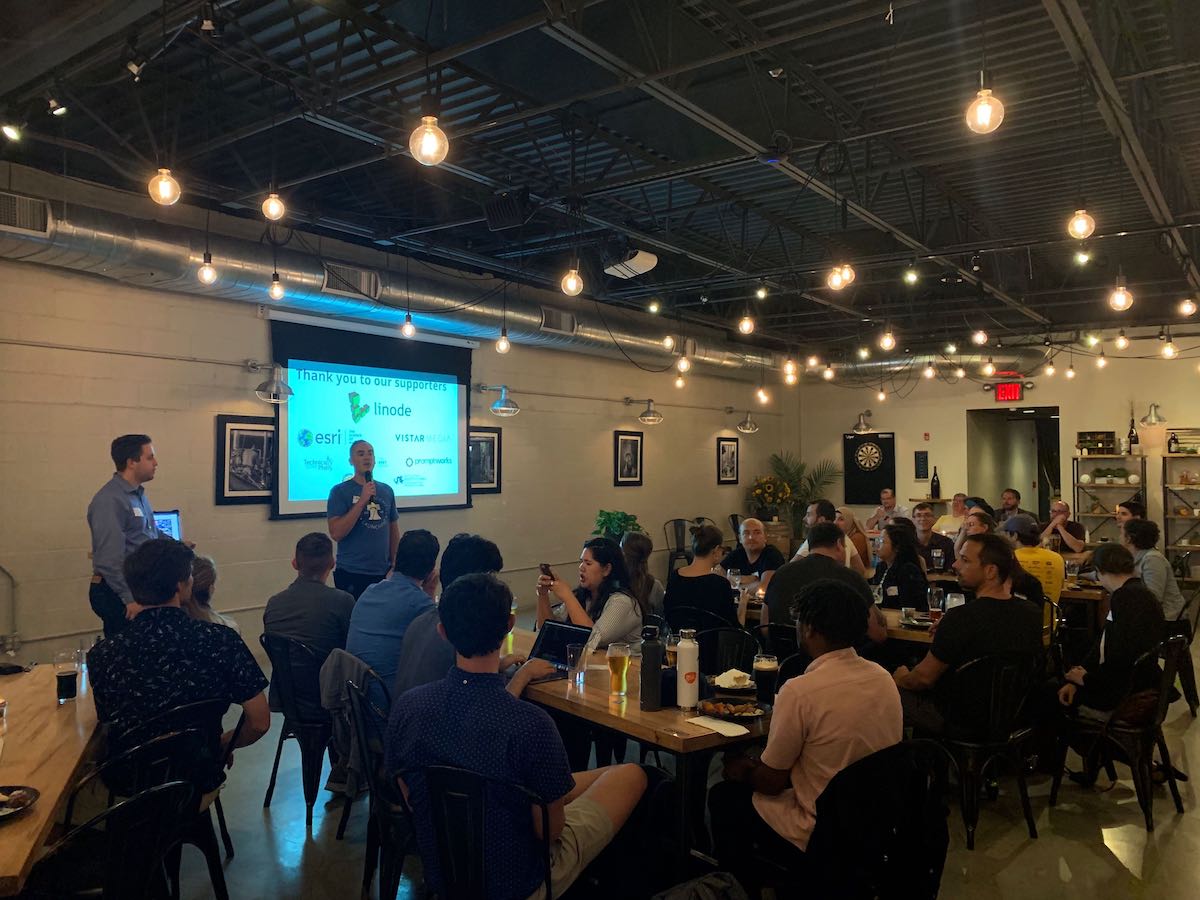The end of September also brought the end of Code for Philly’s monthlong hackathon that invited volunteer dev teams to work on projects supporting better access to essential services and resources for city residents.
The newbie-friendly civic tech organization extended the hackathon model to a month two years ago to give teams the time and energy to build projects that could continue after the hackathon is over.
This year’s theme was “Phundamentals,” which meant projects would aim to foster equitable access to “Philly’s redefined set of basic needs,” as the organization put it. Teams were made up of folks across a variety of industries, Co-Director Charlie Costanzo said, and while many are year-round Code for Philly members, their friends, colleagues and others interested in civic tech joined in.
Eight teams presented their concepts at Yards Brewing Company this week to three panelists: Mark Wheeler, the City of Philadelphia’s chief innovation officer and head of the Office of Innovation and Technology; Lisa Makosewski, executive director of Philly’s Federal Executive Board; and Will Rompala, chief technical officer at Health Union.
Several of the projects focused on data transparency, solutions for citywide issues like the opioid crisis or mass incarceration, or creating a technology that helps undeserved populations:
- Philly Elder Helpers — A website and portal that would connect volunteers with elderly citizens who need help with tasks around the help. The aim is to help residents remain in their home as they age, and project leaders said they’ve taken steps to address safety and legal concerns that may arise. Project leaders cited their own care of their aging parents as inspiration for the project.
- UliftU — This team tackled a UX redesign of the nonprofit’s website to make it easier for folks reentering society after incarceration to get resources and job training.
- Snow-Capped — A software that would allow users to freeze or unfreeze their credit at any given time. It was created in response to security concerns and privacy breeches during the recent Equifax scandal. “This is something everyone should have locked down,” a team member said.
- Reach: SMS Hotline — This software combines a messaging hotline with case management systems so recovery specialists can connect with those with addiction. Professionals can use Slack to send text check-ins, and any data collected will be given to health professionals to help shape the city’s protocol.
- PHLASK — An ecosystem and mapping tool to help residents find access to free water, and help more households become tap water users. (Project leaders cited that more than 40% of households regularly drink out of plastic water bottles.)
- Prevention Point — An app to assist with data management for city departments and programs that managing the opioid crisis.
- Philadelphia Lawyers for Social Equity (PLSE) — This nonprofit initiated two projects, PLSE Expungements and PLSE Pardons. Both focused on making the process of applying for a record expungement or pardon more streamlined, accessible and easy to understand. Expungements is a web portal that assists in filling out the documents required for that application, while an app called PardonMe is in development for the pardoning portion of the project.
After feedback from panelists and questions from the audience, attendees voted for their favorite projects. Snow-Capped, Elder Helpers and the PLSE teams pulled ahead with the most votes.
The projects were in various stages of completion, and Costanzo said teams will continue work on them all year.
“The projects aren’t done by any means, they’re fully expected to continue outside of the structured format of Launchpad,” he said. “Throughout the year we continue weekly events for project teams to take advantage of and continue working at their own pace but with our continued support, encouragement and resources.”
Before you go...
Please consider supporting Technical.ly to keep our independent journalism strong. Unlike most business-focused media outlets, we don’t have a paywall. Instead, we count on your personal and organizational support.
3 ways to support our work:- Contribute to the Journalism Fund. Charitable giving ensures our information remains free and accessible for residents to discover workforce programs and entrepreneurship pathways. This includes philanthropic grants and individual tax-deductible donations from readers like you.
- Use our Preferred Partners. Our directory of vetted providers offers high-quality recommendations for services our readers need, and each referral supports our journalism.
- Use our services. If you need entrepreneurs and tech leaders to buy your services, are seeking technologists to hire or want more professionals to know about your ecosystem, Technical.ly has the biggest and most engaged audience in the mid-Atlantic. We help companies tell their stories and answer big questions to meet and serve our community.
Join our growing Slack community
Join 5,000 tech professionals and entrepreneurs in our community Slack today!

The person charged in the UnitedHealthcare CEO shooting had a ton of tech connections

From rejection to innovation: How I built a tool to beat AI hiring algorithms at their own game

Where are the country’s most vibrant tech and startup communities?



